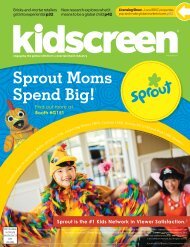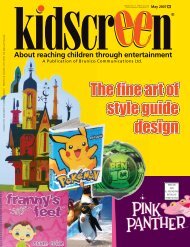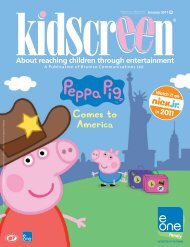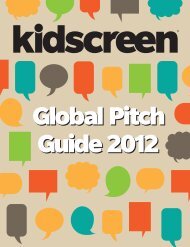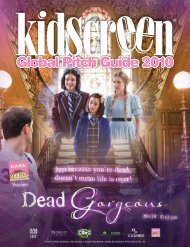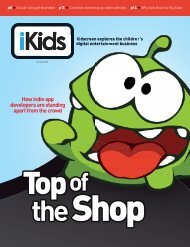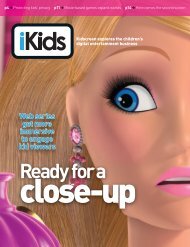download a PDF version - Kidscreen
download a PDF version - Kidscreen
download a PDF version - Kidscreen
Create successful ePaper yourself
Turn your PDF publications into a flip-book with our unique Google optimized e-Paper software.
LicenseeLowdown<br />
Look for Kahn Lucas to<br />
further explore the innate<br />
connection between<br />
dolls and apparel with its<br />
recent acquisition of<br />
Madame Alexander<br />
Kahn Lucas set to expand<br />
after picking up doll house<br />
Who Lancaster County, Pennsylvania-based Kahn Lucas Lancaster is one of the oldest<br />
children’s wear manufacturers in the world. With a focus on apparel for girls from<br />
newborn to preteen, it has global distribution across all tiers of retail.<br />
In June, the company purchased Alexander Doll’s IP and selected assets.<br />
Founded in 1923, the company pioneered the collectible and play doll business and<br />
is best known for its Madame Alexander line, including co-branded products that<br />
feature licenses including Disney, Angelina Ballerina and Fancy Nancy.<br />
“With this acquisition, we are getting heavily involved in licensing again,” says<br />
Howard Kahn, CEO of Kahn Lucas. “We are the only company in the marketplace<br />
that has the ability to be best in class in girls apparel and now in dolls,too,” he says,<br />
adding that there is a natural connection between the two.<br />
What Kahn says the company will maintain all pre-existing licensed partnerships<br />
that Madame Alexander set up.“Their relationships are very exciting for us,” he says.<br />
“They have wonderful products. We have already been bombarded by licensors and<br />
want to expand our products in the doll accessories category.”<br />
Citing the current fl at sales for apparel at US retail, Kahn says that innovation in<br />
the category is a must to impress retailers and consumers.<br />
“The markets want something new and exciting,” he says, explaining that the<br />
acquisition will assist the company in building girls lifestyle brands based on imagination,<br />
open-ended play and creativity. “There is excitement for new interpretations<br />
and new ways to approach it.”<br />
One new avenue, according to Kahn, is to build more experiential retail programs.<br />
As a model, he looks to Alexander Dolls’ existing partnership with speciality<br />
retailer FAO Schwartz that saw the creation of a doll factory and new born nursery,<br />
where girls can customize their own dolls with a variety of specialized apparel and<br />
accessories. Kahn says the company is close to announcing a similar project with a<br />
major European retailer.<br />
Latest Innovation While it’s still early, Kahn says that the Madame Alexander<br />
acquisition will bring new SKUs to mass and specialty retail by Q1 2013.“There will<br />
defi nitely be an acceleration of unique product development,” he says.<br />
And look for the company to add to its stable of licenses with several new girls<br />
lifestyle properties. “We have a couple that we are looking to do something pretty<br />
exciting with,” he says. “If there are properties out there that cater to more than just<br />
the toy market, we are very interested.”<br />
Contact Howard Kahn, CEO, Kahn Lucas, (212-244-4500, hkahn@kahnlucas.com)<br />
–Gary Rusak<br />
Family matters<br />
New study points to shift in<br />
parental purchasing dynamics<br />
The old family consumption paradigm of Mom holding the<br />
purse strings with a modicum of input from Dad and their<br />
2.2 children might need updating, according to Maurice<br />
Wheeler, strategic planning director and co-founder of<br />
the London-based research and creative agency Doco.<br />
Wheeler is currently in the embryonic stages of developing<br />
a model he has dubbed the Family Purchase Dynamic. He presented<br />
some early fi ndings at the Children’s Media Conference<br />
held in Sheffi eld, England in early July.<br />
“It’s not about marketing to the father or mother anymore,”<br />
he says. “It’s much more dynamic and complicated<br />
than that now.”<br />
Doco has started to run the numbers on a small sample survey<br />
it’s undertaken of 320 families in the UK with kids ages six<br />
to 11. The survey was designed to build a better picture of family<br />
consumption, examining who really makes the decisions about<br />
how the money is spent. While it’s early in the process yet, some<br />
of the numbers have raised Wheeler’s brow.<br />
“We are fi nding that [spending] is more collaborative than<br />
we thought,” he says. “A lot of it depends on parenting style<br />
and the family situation. Interestingly, we have found so far<br />
that parents who have less time tend to collaborate with their<br />
children more.”<br />
One seemingly counter-intuitive fi nding is that parents who<br />
perceived themselves as belonging to a lower-income bracket<br />
collaborated less with their kids on purchases than those who<br />
felt more secure in their fi nancial situation.<br />
“I assumed that if you didn’t have much money, you would<br />
actually be more likely to collaborate. If you have one toy to buy,<br />
you are going to make sure that your kid will love it. But that<br />
actually isn’t the case at all. The reverse is true,” says Wheeler.<br />
Furthermore, it would stand to reason that adults who consider<br />
their parenting style “collaborative” would involve their<br />
children more in purchase decisions than those who do not. But<br />
the numbers tell a diff erent story. “There is very little correlation<br />
between those two things,” says Wheeler. “Right now, that’s a<br />
bit of a head-scratcher.”<br />
Another aspect Doco plans to investigate in its wide-ranging<br />
survey is the family structure itself. “We are crunching the<br />
numbers on traditional and non-traditional families to fi nd out<br />
if non-traditional families are more collaborative,” he says.<br />
With a tiny sample size, Wheeler realizes that much<br />
more data will have to be collected before drawing any conclusions<br />
on what he believes might be considered a new<br />
single consumption unit with wide-ranging repercussions<br />
for the entire marketing industry. Currently, Doco is also collecting<br />
completed questionnaires from Brazil, China, India<br />
and Germany.<br />
“Understanding the interplay of how these decisions are<br />
made is interesting,” he says. “It will be a great to help brands<br />
get a better understanding of this space.” –Gary Rusak<br />
July/August 2012<br />
21



